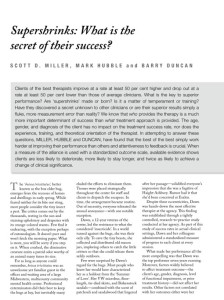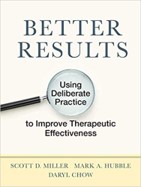 I hope this post finds you, your loved ones, and colleagues, safe and healthy.
I hope this post finds you, your loved ones, and colleagues, safe and healthy.
What an amazing few weeks this has been. Daily life, as most of us know it, has been turned upside down. The clinicians I’ve spoken with are working frantically to adjust to the new reality, including staying abreast of rapidly evolving healthcare regulation and learning how to provide services online.
I cannot think of a time in recent memory when the need to adapt has more pressing. As everyone knows, feedback plays a crucial role in this process.
Last week, I reported a surge in downloads of the Outcome and Session Rating Scales (ORS & SRS), up 21% over the preceding three months. Independent, randomized controlled trials document clients are two and a half times more likely to benefit from therapy when their feedback is solicited via the measures and used to inform care. Good news, eh? Practitioners are looking for methods to enhance their work in these new and challenging circumstances. Only problem is the same research shows it takes time to learn to use the measures effectively — and that’s under the best or, at least, most normal of circumstances!
Given that we are far from normal, the team at the International Center for Clinical Excellence, in combination with longtime technology and continuing education partners, have been working to provide the resources necessary for practitioners to make the leap to online services. In my prior post, a number of tips were shared, including empirically-validating scripts for oral administration of the ORS and SRS as well as instructional videos for texting, email, and online use via the three, authorized FIT software platforms.
We are not done. Below, you will find two, new instructional videos from ICCE Certified Trainers, Stacy Bancroft and Brooke Mathewes. They provide step-by-step instructions and examples of how to administer the measures orally — a useful skill if you are providing services online or via the telephone.




